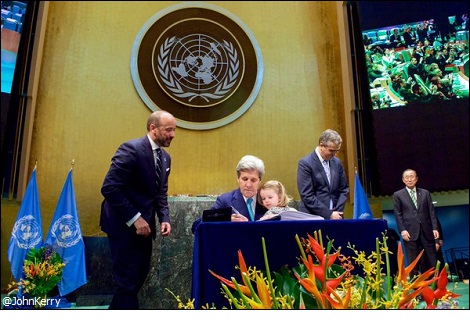
|
|

|
|
| April 20, 2024 |
|
World leaders take historic action on climate change 
UNITED NATIONS--More than 170 countries signed an agreement Friday aimed at limiting the rise of global temperatures and slowing the effects of climate change on the planet.
The deal was agreed to in Paris at the end of last year, but opened for signatures on Friday – Earth Day. “We are in a race against time,” U.N. Secretary-General Ban Ki-moon warned. “The window for keeping global temperature rise well below two degrees Celsius, let alone 1.5 degrees, is rapidly closing. The era of consumption without consequences is over.” He said nations must intensify efforts to de-carbonize their economies and urged support for developing countries in making this transition. Biggest emitters The countries signing the deal represent more than 93 percent of the planet’s greenhouse gas emissions. They are also the largest number of first-day signatories to any international agreement. The world’s biggest emitters, China and the United States, which together account for about 40 percent of emissions, both urged early enforcement of the deal. That would require 55 countries representing 55 percent of global emissions to sign and then ratify the agreement. On Friday, 15 countries, mainly small island nations, submitted their ratifications to the U.N. chief. China’s Vice-Premier, Zhang Gaoli, said his country plans to sign the accord before the G20 summit, which is to take place in September in Hangzhou, China. Secretary of State John Kerry, who signed for the Obama administration, also said the United States plans to formally join the Paris agreement this year. “The power of this agreement is the opportunity that it creates,” Kerry said. He noted that investment in renewable energies are at an all-time high and that for the first time ever, more of the world’s money was spent on renewable energy technologies instead of new fossil fuel plants. “Today we know: The new energy future, the efficiencies, the alternative resources, the clean options – none of what we have to achieve is beyond our capacity technologically. The only question is whether it is beyond our collective resolve,” Kerry added. Secretary Kerry signed the agreement with his toddler granddaughter on his lap, reinforcing the idea that this climate agreement will impact future generations. Brazil’s President Dilma Rousseff, who is facing impeachment at home, participated in Friday’s signing ceremony. “All renewable sources of energy will have an increased share in our energy mix, accounting for up to 45 percent by 2030,” she said. She said the government is also working to restore 12 million hectares of forests and 15 million hectares of pastoral lands. Supporters “We can congratulate each other today but it will mean absolutely nothing if you return to your countries and fail to push beyond the promises of this historic agreement,” Hollywood actor and climate activist Leonardo DiCaprio told leaders. “Now is the time for bold unprecedented action.” Hindou Oumarou Ibrahim, a civil society representative from Chad, urged developed countries to expand financing for adaptation measures, saying without it, “soon there will be no one to adapt.” She warned that people are going to become climate refugees as their crops and livestock are disappearing. “Climate change is adding poverty to poverty every day.” While leaders congratulated themselves for signing up to the Paris Agreement, they seemed to fail to notice the irony of the emissions they created traveling from all corners of the planet to attend Friday’s ceremony. Key points of deal Goal: The long-term objective is to make sure global warming stays "well below" 2 degrees Celsius and pursue efforts to limit the rise to 1.5 degrees Celsius. Targets: Countries agreed to national targets for reducing greenhouse gas emissions every five years. Developed countries are expected to cut their emissions; developing nations are "encouraged" to do so. Transparency: There is no penalty for countries that miss their emissions targets. But the agreement has transparency rules to encourage countries to follow through. Money: The deal calls for wealthy countries to continue to offer financial support to help poor countries reduce their emissions. Small Islands: The agreement includes a section recognizing "loss and damage" associated with climate-related disasters that is seen as a victory for small nations threatened by rising seas. (Source: VOA News) Story Date: April 24, 2016
|